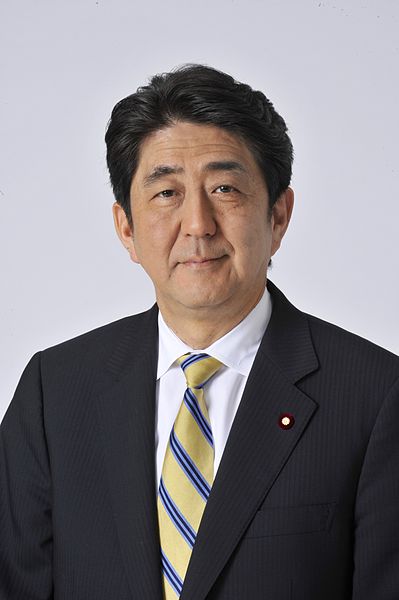

ShinzÃ
 Abe (Japanese Prime Minister); Photo from G8 UK Presidency
The 'British Snowden', an MI5 whistleblower who is not able to return to Britain safely (essentially a fugitive now), speaks about the new Snowden Web site [1]. I had the pleasure of speaking with her and she is very widely quoted by the media right now (except in the British media). See, here in the UK there is a war on the media [1, 2, 3] amid an EU blunder which jeopardises Britain's status in the European Union [2]. It turns out that spying on your allies on behalf of some distant superpower (the United States) is not a good thing to do.
"Standing up for Snowden is standing up for the rule of law, justice, and ethics."Where do we go from here? Well, the Free Software Foundation takes action [8]. We need to defend the disclosure of all this information. Snowden's leaks revealed (back in August) where trillions of dollars of taxpayers' money (or national debt to which they're tied) are going [9] and these leaks also give a very strong challenge to US law, potentially banning some of the NSA's current actions, which are already against the law anyway [10].
Standing up for Snowden is standing up for the rule of law, justice, and ethics. No more need people be barred from basic information about how public money is spent. Espionage is not "cool" and stabbing continental Europe in the back is not what British citizens would consider a policy that they can support. If the US uses Japan and other small countries (Korea for example) to weaken Indochina while also using the UK (and Sweden among others) to spy on Russia and the European Union, how does one justify unions? Unless we assume that all ethics and good values are derived from US culture we should rethink all these collusions among G8/NATO members.
If laws are being passed to ban freedom of the press (or seriously restrict it), then who is going to cover what Japanese companies and authorities hide from the public ahead of a cancer epidemic [11,12] or after BP barred the press from assessing the real impact of its long-lasting pollution [13]? It's one thing to bar journalists from publishing what's being labeled "state secrets"; using the same laws we may find people who publish corporate secrets (evidence of harm or misconduct) criminalised as well. Down the slippery slope we go. ⬆
Related/contextual items from the news:
And here’s another aide mem€oire of the dis€clos€ures so far. The impact of these dis€clos€ures is global. Edward Snowden is simply the most sig€ni€fic€ant whis€tleblower in mod€ern history.
"While leading politicians of other European countries and officers of the EU itself were keen to express their concern over the latest revelations of US spying on its allies – the President of the European Parliament Martin Schulz said that US secret services were ‘out of control’ – British Prime Minister David Cameron has only said that he thought that the EU statement on the matter was ‘good and sensible’ and that he agreed with it. German Chancellor Angela Merkel said Cameron ‘silently acquiesced” to the statement. At a press conference, Cameron refused to comment about the recent NSA revelations.
"The muted British reaction to what is a truly outrageous scandal, is proof, if indeed any further proof were needed, of what Britain's main role in the EU is: to act as a Trojan horse to defend and further the interests of the government of the United States of America."
Prime minister alludes to courts and D notices and singles out the Guardian over coverage of Edward Snowden saga
You don’t need to be talking to a terror suspect to have your communications data analysed by the NSA. The agency is allowed to travel “three hops” from its targets – who could be people who talk to people who talk to people who talk to you. Facebook, where the typical user has 190 friends, shows how three degrees of separation gets you to a network bigger than the population of Colorado. How many people are three “hops” from you?
The U.S. National Security Agency sought the Japanese government’s cooperation in 2011 over wiretapping fiber-optic cables carrying phone and Internet data across the Asia-Pacific region, but the request was rejected, sources said Saturday.
Japanese Prime Minister Shinzo Abe's government is planning a state secrets act that critics say could curtail public access to information on a wide range of issues, including tensions with China and the Fukushima nuclear crisis.
On Saturday, October 26, 2013, the FSF joined more than three thousand privacy advocates in Washington, DC to call for an end to mass surveillance conducted by the NSA.
The legislation has support from Republicans and Democrats in both the House and Senate, and from groups like the American Civil Liberties Union and National Rifle Association. But the USA FREEDOM Act’s passage into law remains uncertain.
Despite the departure of all his neighbours and the unexplained deaths of some of his stock, Tokue Hosokawa refuses to budge
Toxicologists 'predicted with certainty' that Gulf of Mexico residents and clean-up workers would become severely ill.